MercoPress. South Atlantic News Agency
Tag: Raúl Castro
-
Friday, March 8th 2013 - 08:13 UTC
Emotional Cristina Fernandez back in Argentina misses Chavez funeral ceremony
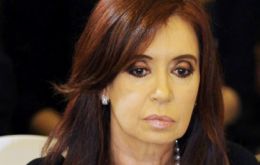
As world leaders were arriving at Caracas late Thursday for Friday’s funeral ceremony of President Hugo Chavez, Argentine president Cristina Fernandez and her delegation were back in Buenos Aires. The Argentine president visited the Military Hospital’s chapel Thursday noon for a final goodbye to the Venezuelan leader and then ordered the flight back to Buenos Aires.
-
Thursday, March 7th 2013 - 06:56 UTC
Cuban leadership trusts Venezuelan oil and financial aid will continue to pour in
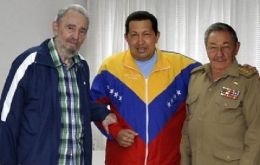
A mix of sorrow, self-interest and dread took hold of Cuba as word spread like wildfire that Venezuelan President Hugo Chávez, who had done so much for the country, was dead. While the official newscast devoted its entire program to events unfolding in Caracas, the government reaction was slow in coming.
-
Monday, February 25th 2013 - 05:48 UTC
Cuba re-elects Raul Castro and unveils his de facto political heir: Diaz-Canel
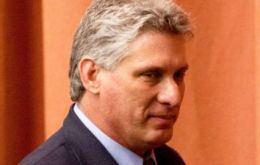
Raul Castro was re-elected as Cuba's president Sunday, officially to his last five-year term, with a new regime number two, Council of State Vice President Miguel Diaz-Canel, official media said.
-
Tuesday, January 29th 2013 - 06:05 UTC
Raul Castro assumes CELAC chair calling for integration and independence from the US
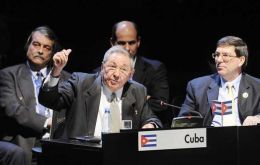
Cuba formally assumed Monday the presidency of the Community of Latinamerican and Caribbean States during the group’s summit in Chile calling for regional integration and independence from the United States.
-
Tuesday, January 29th 2013 - 03:34 UTC
CELAC is “no threat for OAS, rather a useful component” says Insulza

The Community of Latinamerican and Caribbean States, CELAC, is “no threat” but rather a useful component for the Organization of American States, OAS, said Secretary General Jose Miguel Insulza during his attendance to the Celac summit meetings.
-
Monday, January 28th 2013 - 06:08 UTC
Cuba takes CELAC chair on Monday; expectations regarding Havana’s proposals
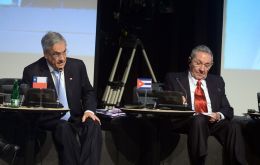
The first summit of the Community of Latinamerican and Caribbean States, CELAC, the brain child of president Hugo Chavez, paid tribute to the Venezuelan leader who is recovering from cancer surgery in Havana, Cuba, the country that on Monday will be receiving the group’s chair from Chile.
-
Wednesday, January 16th 2013 - 06:45 UTC
Cristina Fernandez has hand-written copies of Chavez political testament, says Bocaranda
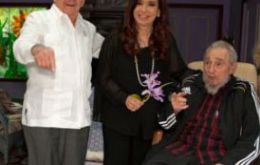
Argentine president Cristina Fernandez in her recent visit to Cuba declined to see the ailing Hugo Chavez but surprised her hosts, the Castro brothers, when she revealed having received two letters from the Venezuelan leader which she considered to be his political testament.
-
Monday, January 14th 2013 - 06:58 UTC
Chavez health ‘improving’; top Venezuelan officials meet in Havana with Raul Castro
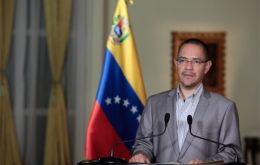
Venezuelan President Hugo Chavez's lung infection has been controlled and his medical state is improving, the government announced on Sunday while four of the most powerful figures gathered in Havana allegedly to report to the cancer-stricken leader and meet with Cuban allies.
-
Monday, January 14th 2013 - 03:28 UTC
Cubans a little bit more free: restrictions on overseas travel relaxed after 50 years
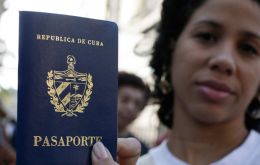
After over half a century, Cuba's new immigration rules that will take effect on January 14 will relax overseas travel restrictions, Havana authorities said. From Tuesday Cubans intending to travel can apply for a passport without the need to present a government permit, known as the White Card, or an invitation letter from abroad, two prior requisites that made travel planning more onerous, according to Cuba's immigration bureau (IND).
-
Wednesday, October 17th 2012 - 04:37 UTC
After half a century Cuba scraps travel restrictions, but they remain for ‘human talent’
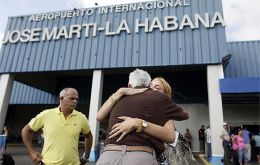
Cuba will scrap much reviled travel restrictions starting in January, easing most Cubans' exit and return, state media said on Tuesday, in the Castro brothers’ regime first major immigration reform in half a century.
